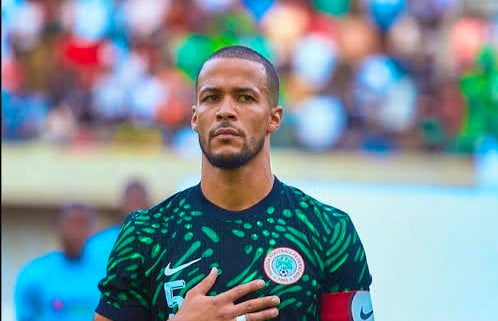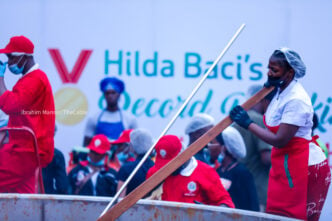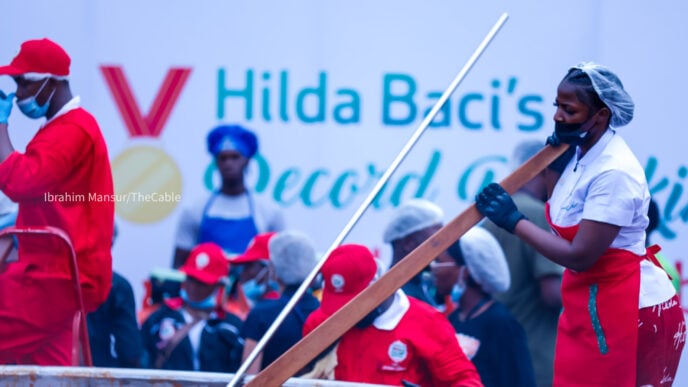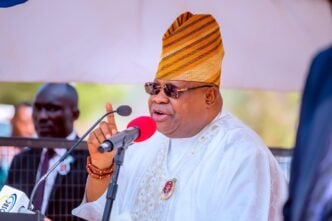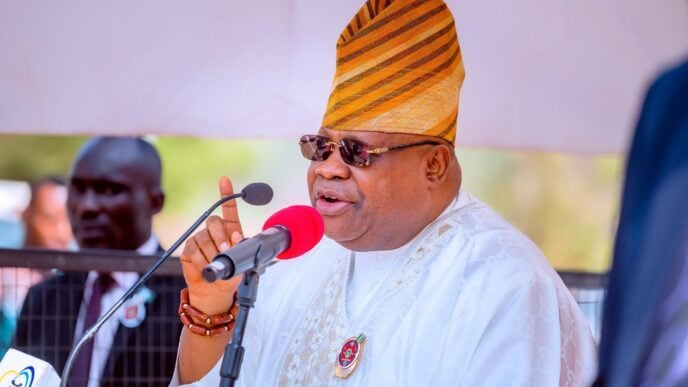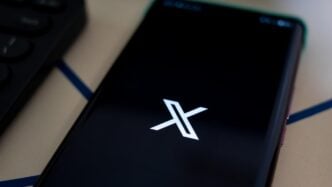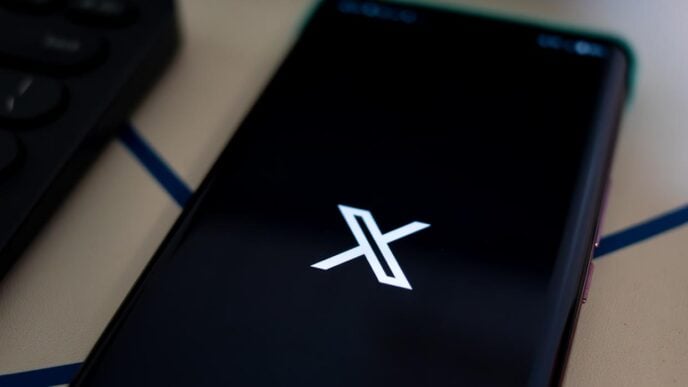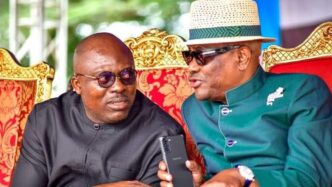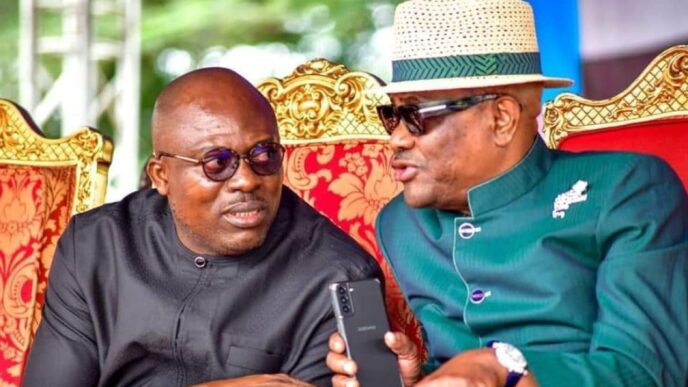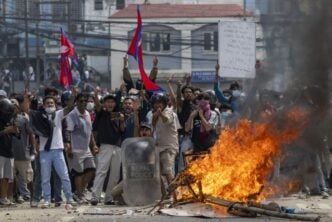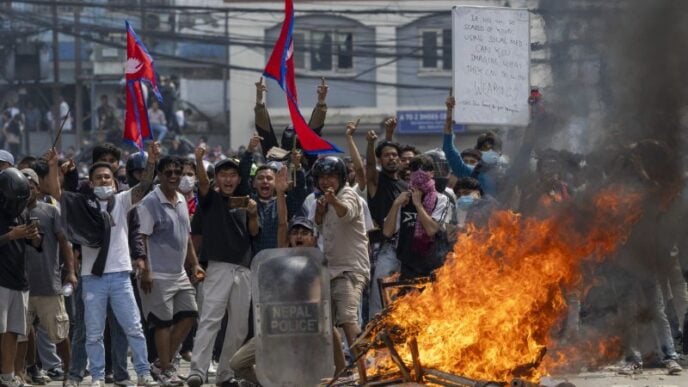William Troost-Ekong, Super Eagles' captain
Following Nigeria’s devastating 1-1 draw with South Africa, a result that all but extinguished the country’s 2026 FIFA World Cup hopes, the Nigerian Football Federation (NFF) has, once again, executed a masterclass in deflection and buck-passing. The post-match “press release” by the body’s spokesman, Ademola Olajire, which singled out William Troost-Ekong for an unfortunate own goal and Cyril Dessers for what is described as a lacklustre performance in the press statement, is not just a misdiagnosis of the problem; it is the problem itself.
The last FIFA international window was meant to be a window of redemption. A chance for the Super Eagles to steady the ship, silence doubters, and keep the 2026 FIFA World Cup dream alive. Instead, the draw against South Africa in Bloemfontein was nothing short of a footballing obituary. Nigeria needed a win—just one win by any goal margin—to stay afloat and remain in contention. But in typical fashion, we contrived to shoot ourselves in the foot, and now, the World Cup train has left the station without Africa’s most populous nation. Imagine Nigerians having to, once again, deploy calculators while trying to see if their darling national team would be able to qualify for an expanded World Cup in which Africa is allotted no fewer than a record nine (9) slots! I don’t think it can get any worse than that. To cap the irony, we found ourselves in a not-so-difficult group (C), comprising South Africa, the Benin Republic, Rwanda, Lesotho, and Zimbabwe, but like I usually say, in Nigeria, we never miss an opportunity to miss an opportunity.
Predictably, the Nigerian Football Federation (NFF) has wasted no time playing its favorite game – scapegoating. Captain William Troost-Ekong was a target of an uncalled-for criticism for his unfortunate “own goal” in the 25th minute of the first half. Scoring an “own goal” in football is a phenomenon that is as old as the game itself. But it has become an instrument of scapegoating for the sanctimonious NFF. Cyril Dessers was also pilloried for “failing to stamp his authority upfront,” and the press release read like a “tribunal verdict.” Conveniently absent from the post-mortem analysis contained in the press release was the NFF’s own reflection in the mirror—ineptitude, lack of professionalism, and patriotism. The eye sees other things but can’t see itself. This is a governing body that is peopled by characters who, as adults, watched the likes of Etim Esin, Jay Jay Okocha, and Kanu Nwankwo, among others, who epitomized creativity, upon which the vibrancy of the Super Eagles rested, during their respective days as professional footballers. That was a period that coincided with the country’s golden footballing era. But they never saw the need to scout for the replacements of these icons whose talents and styles of play signposted the significance of a creative midfield in how a strong team performs, ever since curtains drew on their glorious careers. This is a federation that never allows a national team coach to determine who he invites or does not invite, depending on his vision of how he wants the team to operate. This is an NFF that has gained notoriety for not allowing a coach a free hand in selecting his starting eleven on match days. But it now finds it convenient to scapegoat players for having an uncharacteristic bad day in office.
While it is easy to point fingers at the players on the pitch, the NFF’s decision to publicly scapegoat them is a shocking abdication of responsibility. It is a tactic designed to divert attention from the true epicentre of Nigerian football’s rot—the very institution now apportioning blame.
Advertisement
To further prove that it is the stock-in trade for the Ibrahim Gusau-led NFF, they threw Olajire (who wrote the piece on behalf of the federation) under the bus. They denied knowledge of it—they deny ever approving it. Meanwhile, the denial is due to the negative reactions it elicited from lovers of the beautiful game across the country.
While I am not holding a brief for the federation’s spokesperson, he remains one of the finest Nigerian sports writers alive; hence, his being chosen for the office was not a misplaced one. So, as the official through whose office press statements are released regularly, he wouldn’t have pushed it out without an approval from the appropriate authority.
I shudder to ask: sincerely speaking, do they think my 4-year-old daughter would believe them that they did not read and approve the statement before it was released for public consumption? Is Mohammed Sanusi (the NFF’s scribe) trying to tell us that they’ve not been aware of the ones he’s been releasing before now? Even if that is the case, do they know that they’re liable for any gaffe the spokesperson might have committed? But maybe they need to take a crass course from the NFF’s legal adviser on what the term “vicarious liability” means in law.
Advertisement
An Own Goal Scored in the Boardrooms, Not on the Pitch
The Super Eagles’ failure to qualify from what was widely considered a manageable group is not the result of one errant deflection leading to an undesirable own goal or a striker’s poor form in a match or two. It is the culmination of years of systemic failure, “fraudulent neglect,” poor planning, and breathtaking administrative incompetence by the NFF. Ask Gusau’s NFF to name one national youth competition that is alive today that he intends to use as an avenue to discover the next generation of talents to fill the void left in the midfield by the exits of Okocha and Kanu and to turn around the fortunes of the national team: his response would be like mine if you gave me a Further Mathematics equation to solve. Note that I was a perennial failure when it came to ordinary Mathematics, during my secondary school days. My competence in Further Mathematics is, therefore, neither here, nor there. So, as a matter of course, there is no such plan on their desk because that is not where free money (estacodes in foreign currencies) comes from. There is no estacode on offer for organising a grassroots competition. Such largesse only comes from FIFA or CAF in the form of a lump sum “bonus” for qualifying for and participating in any of the global or continental events. Again, there would be grants from the Federal Government to prepare the team—funds that are never retired. It also comes from playing friendly matches if other countries invite us.
Just like their elder sister and the governing body of athletics—the Athletics Federation of Nigeria (AFN), whose official delegate to the ongoing World Athletics Championships in Tokyo, Japan, outnumbers athletes, who are only fifteen. The currency is estacode. They have no business with Nigeria doing well at the meet. Many of our athletes who qualified for their various events were given a “Favour-Ofili “treatment”—the officials refused to register them for the championship for reasons best known to them. Nigeria would, as a result, not be represented in any of the relay team events (4×100m and 4×400m) due to the limited number of athletes in the country’s contingent. As if that is not enough, they allegedly provided the 15 athletes with substandard kits, according to the world record holder in the women’s 100m hurdle, Tobiloba Amusan. Due to their administrative tardiness and lack of professionalism, Ofili, who many have identified as the future of the country’s athletics (sprints), was frustrated in two Olympic Games (Tokyo 2020 and Paris 2024) consecutively. The young lady, having had enough of their corruption-induced ineptitude, would, about a couple of months ago, switch her international allegiance to Turkey—a country that is not as blessed as Nigeria in terms of talents. Nigeria’s loss is Turkey’s gain. The federation has, however, responded, saying that would not affect our fortunes at international meets, while trying to gaslight the young lady, saying her reason for defecting to Turkey is induced by the money ($500,000) on offer. We’re talking about an athlete who’d suffered two consecutive Olympic heartbreaks due to the chronic corruption and ineptitude of the federation’s officials. If you are marvelled by that hollow response, here is another one: Amusan accused them of supplying substandard kits to the athletes representing the country at the ongoing World Athletics Championship, and they responded, saying, She flew into the event in business class. As though that explains the reason for the supply of substandard kits. You can’t get it more puerile than that. Amusan counter-responded by winning the silver medal in her event and Nigeria’s only medal so far. I learnt the National Sports Commission (NSC) had brokered peace between them and the world record holder, as they’re desperate to brandish her achievement as being a result of their industry and administrative efficiency. Always wanting to reap where they do not sow. What a shameless bunch!
Pardon my digression. Back to the issue of the NFF. Where was the body’s foresight in ensuring that a stable and competent technical crew was appointed for the Super Eagles in a timely manner after the ill-fated appointment of coach Finidi George? The team navigated a crucial qualifier phase and the AFCON under a cloud of contractual uncertainty with coach José Peseiro, a situation that undoubtedly affected long-term planning. Up until now, they never gave Nigerians any explanation (flimsy or otherwise) on what happened to coach Finidi George’s contract and his short-lived tenure as the team’s coach. Nobody came out to confirm or deny his resignation. They carried on as if nothing happened. That is a classic episode of lack of accountability for which they’re known. As Nigerians still struggle to process that visionlessness, they thrust upon Nigerians a “Mali reject,” Eric Chelle (no disrespect meant), as the man to tinker with the destiny of a team that gives hundreds of millions of soccer-crazy Nigerians joy. Nigeria has now played eight qualifying matches, winning only two—that is an all-time low for one of the three biggest footballing brands on the continent. This is a team once ranked the 5th best footballing national team in the world. A team that usually qualifies for the World Cup with at least a match to spare, when there were limited slots to vie for.
Advertisement
Where was the NFF’s provision of adequate infrastructure, consistent friendly matches against top-tier opposition, and a seamless logistics framework to get the team ready for these crucial matches? How can players be expected to perform at their peak when they are often plagued by issues ranging from delayed flights to unpaid bonuses? How can they concentrate when the national team camp is always invaded by social media content creators, distracting the players’ concentration? Where is camp discipline being enforced by the NFF?
Remember, my last piece on ex-internationals, titled “Beyond the Blame Game: Financial Literacy and Entitlement Among Nigerian Athletes,” published on August 29, 2025, dwelt on the entitlement mentalities of some of them, which I roundly condemned. I posited that they were paid their dues (bonuses and allowances) whenever they represented the country and therefore deserve no more unsustainable pampering. But under this current group of charlatans masquerading as administrators, I doubt that obtains. Allowances are not paid as and when due.
The notion that a federation can consistently fail in its duty to provide a conducive environment for players to perform and then turn around to blame the athletes for underperforming is the height of hypocrisy. Troost-Ekong, the same man who bled for the nation’s colour (green-white-green) and the crest and was crowned AFCON “Player of the Tournament” in Cote d’Ivoire just a little over a year ago, is now a target of unfair criticism for scoring a non-deliberate own goal. Dessers, a player thrust into a role in a team often lacking creativity and coherent attacking structure, is singled out for harsh criticism. This public shaming is not leadership; it is a cowardly attempt to shift the narrative and deflect the focus of the klieg light on where the real problem lies—the real scorer of the own goal, the real misfiring striker, which is the NFF itself.
The Way Forward: A Blueprint for Resurrection
Advertisement
The clamour to disband the entire team and the NFF board, by no less important a football personality than the former captain of the team, a 2013 AFCON winner, John Obi Mikel, is understandable. It echoes the minds of millions of Nigerians who have been subjected to constant heartbreak lately by the shambolic performances of the team. It is born out of love for the team and patriotic zeal, which is always met with profound frustration and disappointment. However, a scorched-earth policy, a knee-jerk reaction, is not the answer. What we need is a radical, surgical, and transparent overhaul.
1. Embrace Radical Administrative Reform: The NFF must be restructured from the ground up. This requires hiring qualified, technocratic professionals in key areas—football administration, sports science, youth development, and finance—based on merit, not political patronage. Not appointing “yes sir” men who would be asked to “jump up,” and they ask, “How high?” Governance must be transparent, especially regarding finances and decision-making. But any overhauling that retains the current crop of helmsmen would amount to a massive joke. You can’t be a part of the problem and, at the same time, be a part of the solution.
Advertisement
2. Invest in a Football Ecosystem: Nigerian football cannot live by the Super Eagles alone. It is time the NSC Chairman, Shehu Dikko’s vision of a “sports economy” was brought to reality, with the football sub-sector as a pilot scheme. His meet-and-greet session should be over, as it should be time to hit the ground running. The NFF must develop a comprehensive blueprint that focuses on: · Grassroots & Youth Development: Revamping the aged, neglected “youth leagues,” youth competitions (like the now-defunct Segun Odegbami-managed Shell Cup—for all Nigerian secondary schools), and academies to create a sustainable conveyor belt for talent production. This could be complemented with a robust scouting network to comb the nooks and crannies of Europe for Nigerians who were born and bred abroad but are willing to don the famous green-white-green jersey. Yes, it is their right as Nigerians, provided they’re willing to sweat it out for a slot in the team. Ethan Nwaneri of Arsenal is one emerging creative monster who is still eligible to represent Nigeria. Effort should be made by the NFF to reach out to his family to explore the possibility of him switching his international allegiance to Nigeria before he plays for the Three Lions and becomes cap-tied.
- The Nigeria Premier Football League (NPFL): Making it a true priority by improving infrastructure, ensuring financial stability for clubs, and making the league competitive and attractive again for talent retention to serve as the primary source of playing personnel for the Super Eagles. A strong domestic league is the bedrock of a strong national team. This we must do if we learned any lesson at all from the just-concluded CHAN 2024, co-hosted by Kenya, Tanzania, and Uganda. Nigeria was beaten 4-0 by a country that has been at war for years now. Or, is anybody going to tell me that our shambolic outing at the tournament is not a reflection of the quality of our domestic league? That is a cause for a sober reflection on how shabbily the NFF had treated the NPFL.
- A Clear Football Philosophy: Establishing a cohesive playing style that is taught from the youth teams all the way to the Super Eagles, ensuring every player called up understands the “Nigerian way” of playing. Traditionally, Nigerian football at the national team level thrived on wing play (4-4-2). What informed the decision to jettison it remains a subject of scientific inquiry.
3. Professionalise the Super Eagles
Advertisement
The national team must be treated as a professional entity. This means appointing a visionary technical adviser and coach with a clear long-term project, not just for winning the next match, but for building a team for the future. Get a vibrant marketing team to get robust sponsorship for the team to eliminate the eternal cry of lack of funds to execute projects. The team is too big a brand not to be rightly marketed for maximum benefits.
- Ensuring impeccable logistics, timely payment of allowances, and a best-in-class camping environment to allow players to focus solely on football, and not social media content creation.
- Building a squad based on form, hunger, and tactical fit, not just reputation or past glories, or who is in the personal good book of the NFF officials.
The 2026 World Cup dream is all but over. The painful truth is that this failure belongs to the NFF, not Troost-Ekong or Dessers. Instead of looking for fall guys, its leadership must finally demonstrate the courage to look in the mirror and tell itself the hard truth. The redemption of Nigerian football requires not just new players, but a new mindset at the very top. The mission is clear: rebuild the foundation, or the superstructure continues to crumble.
Advertisement
Abubakar writes from Ilorin, Kwara State. He can be reached via 08051388285 or [email protected].
Views expressed by contributors are strictly personal and not of TheCable.

